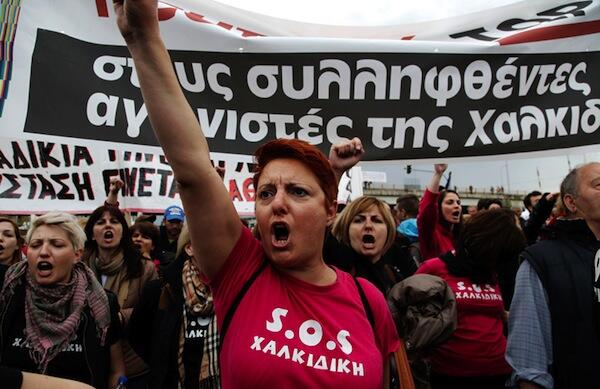
In Greece, the new government is bringing optimism to many. I talked with Sofia Tzitzikou the vice president of UNICEF Greece and a dedicated activist for health rights. As a pharmacist she became one of the key volunteers to run a community clinic in Athens that has served the population made destitute after the scandal of the speculative coup on Greece. The Troika was sent with no legitimacy to implement neoliberal structural adjustment program renamed austerity measures.
Sofia first said that the election of Syriza gave her a sentiment of optimism, although she was aware of external and internal powerful pressures from Capital, represented by investors and speculators of all sorts who participated to the destruction of Greece.
She described the reaction in Athens after the election as full of emotion rather than pure joy. “They could not believe what happened,” she said. The evening of the election some in the streets asked, “Is it a dream?” The crowd was not jubilant as for a soccer game. Instead of honking, there was a great lucidity that there will be no magic to recovery. Sofia senses that a new solidarity has been formed through the suffering of the past years. Actually today, 70% of Greeks are convinced that the new prime minister and his team will succeed.
Certainly the women cleaners of the finance minister were aware of this new solidarity. They resisted the pressure of the establishment and challenged the previous government of Antonis Samaras that envisioned privatization and complete removal of labor protection as the future for Greece. The Supreme Court was supposed to decide their case. Instead the new government of Alexis Tsipras re-employed them immediately. It also reestablished electricity to the 300 000 households who could not afford it and raised the minimum wage to the level it was before.
People have been unified in the darkness of unemployment and attacks against unions. In this context the health care system erased about 40 % of the population from the system, immediately depriving them of medical care. Women were not guaranteed any sexual or reproductive health. To the scandal of some, women not able to deliver their babies in a safe manner.
According to Sofia, the country is in ruins and needs to rebuild.
The new government’s first symbolic action was to remove the anti riot barricades that were placed in front of the parliament to block the anti austerity demonstrators. Another immediate measure was to stop the privatization of the public domains such as the ports of Piraeus and Thessaloniki and the electricity services. They also eliminated the co-pay in public hospitals. Then, the new government declared the end of “Xenia Zeus” a program reported by Human Rights Watch as an abusive crack down on migrants. These symbolic and people-oriented decisions brought confidence needed in order to continue the necessary changes.
Sofia’s only regret is that women don’t hold any of the key ministries of new government: “That is a handicap, I don’t want to be against but it would have been more positive.” Still, Tasia Christodoulopoulou, the new Migration Minister, wants to grant Greek citizenship to all children born in Greece to end this state of no rights for migrants’ children born in Greece.
Sofia recognized that to see Zoé Konstantopoulou becoming the youngest president of the parliament elected with the greatest number of votes in the history of Greece compensated a little for the minimal women’s representation in the government. Zoé Konstantopoulou has been active on every front since her first election at the parliament. She testified in the documentary “Canaries in the Coal Mine.”
As the president of the parliament she pledged to combat corruption. She wants to reopen judicial affairs that have been unlawfully forgotten. This would end the privileges that have degraded parliament over the past years. One example of this degradation is the armaments scandal, involving German companies, occurring while pension and salaries were being amputated. Konstantopoulou is calling for transparency and participation of the social actors and the removal of the formal elite that hold no parliamentary positions. She also will reconstitute the commission on the Nazi war reparations and German debt to Greece. Her program is ambitious but she has proven in the past that she pursues what she believes to be the best for the country.
Sofia expressed confidence but warned, “The feminist movement has even more responsibility now that it can organize. It is the right time to present propositions based on solidarity.” She recognized that solidarity in Europe is crucial against neoliberal powers. Greece is showing the rest of Europe that civil society is still alive and democratic and there is an alternative to the austerity measures and the rule of the market and its oligarchs.
Sofia explained that the urgency is the questions of women’s rights and protection as they have been the first victims of the austerity measures. This is why they are joining the European Caravan of the World March of Women that is “working to build a feminist, solidarity-based economy, one that alters existing patterns of production and reproduction, distribution and consumption”. Sofia Tzitzikou concluded, “Ca commence maintenant” (“It starts today!”)
(Photo Credit: Lefteris Piatarakis/AP)